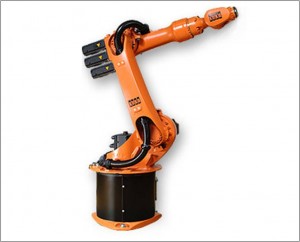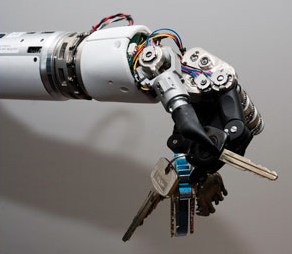or Mechatronic Engineering, humourously (but incorrectly) referred to as Megatronics at times. In Afrikaans Megatronika or Megatroniese Ingenieurswese. What is it? What can you do with it? When I started studying I didn’t know, after 5 years I think I have a vague idea. So below I’m going to post what I know.
In it’s simplest form it’s a combination of Mechanical and Electronic Engineering. If I really don’t feel like explaining, I simplify it to robotics. This is certainly a large portion of Mechatronics, but by no means a limiting factor.
Mechatronics as a named profession is fairly new, but the idea has always been there. In the South African context, UCT have had an accredited BSc (Eng) Mechatronics course since 1997 (although how long it has actually been running is uncertain), NMMU a BEng since 2007 (first graduates) and Stellenbosch since 2005 [1]. Potchefstroom University (NWU) are apparently aiming to start a course in the next few years [2]. Although not offered in the BEng format, UKZN do offer Masters through their Mechatronics and Robotic Research Group [3]. [EDIT: added list of BTech degrees and Diplomas offered at the bottom of the post]
Mechatronics at Stellenbosch [2]
I completed my BEng Mechatronics at Stellenbosch University in 2011. The Mechatronics course was presented by the Department of Mechanical and Mechatronic Engineering in a four year course. The first two years were identical to that of those studying towards a BEng Mechanical. The first year course is identical for all engineering students. In the third and fourth years, the two courses still followed similar routes, with the Mechatronics course replacing several Mechanical courses with some courses presented by the Department of Electronic and Electrical Engineering. In third year these included Electronics and Computer System’s courses and fourth year Electronics and Electronic Design Courses. Losing out on some Strength of Materials and Thermo-Fluid Mechanics.
The department put it this way [6]
The most important difference between the mechanical engineering programme and the mechatronic programme is that mechanical engineers are equipped to develop mechatronic systems with existing controllers (computers, PLC’s, etc.), while mechatronic engineers are also equipped to develop specialised controllers (e.g. for embedded controllers) and the relevant electronics themselves.
At the time, the Head of Department felt that Mechatronics as an entity was still too new. Employers weren’t advertising for Mechatronic Engineers, and didn’t really know what to do with them when they did get them. This resulted in the close ties between the Mechanical and Mechatronic courses. I was often unhappy about this, having would of preferred more focus on the Electronics, but in the end it worked out. And the HoD’s opinions were/are valid.
When I chose Mechatronics, I didn’t know where I was going to work, I chose the course because it sounded interesting. It wasn’t until my final year that I found a direction to work towards. Course setups at different universities are going to be different, and will put emphasis on different subjects, that doesn’t necessarily make one better than the other. Either way you’re going to come out of it with a degree and a fair amount of knowledge. Most importantly though (and this is true for any engineering degree) is you’ll know how to learn.
I’m quite confident that specific things that I learn in my first year of work will be of more value to my career than a specific subject at varsity, but having struggled through several subjects, I know I can figure out most things that come my way. I know where to look and how to go about solving problems.
In my final year we were a class of 85 Mechanical/Mechatronic students, of which I’d say about 30-35 received their BEng Mechatronics in 2011.
Mechatronics at NMMU [2]
NMMU have a slightly different setup. Mechatronics is presented by the Mechatronics school of the Department of Engineering, the Built Environment and IT. Mechatronics is the only Engineering degree they offer. As such, first year physics and maths are taken alongside BSc students and after the first year, courses taken are aimed only at Mechatronics students. The format of the course is still identical to that of when it started giving a good balance of subjects. The University also offers an array of BTech degrees in other Engineering fields.
I’m currently pursuing my master’s degree at NMMU. Their 4th year BEng Mechatronics class has roughly 25 students in it and the 3rd year class about 30. First year applications are limited to 60, with the most recent 1st year class starting with 50 students. The Mechatronics department is currently sponsored by General Motors South Africa (who have a plant in PE) and also have close ties to the Volkswagen plant in Uitenhage.
Mechatronics in General
Mechatronics as a career is still finding its feet. Meaning many consider it a jack of all trades, master of none type of situation, and although the course may feel that way, it’s certainly not the end of the story.
Mechatronics isn’t a new field, it’s just finally been given a name. When you tell people you’re a Mechatronic Engineer they don’t know what that is. I had a month stint at a large production facility as part of vacation training and I was asked to choose between focusing on their Mechanical or Electrical divisions, eventually settling for a bit of time at each. But that’s how businesses in SA are structured. This will change.
Several Mechatronic Engineers that I know have taken up Automation maintenance posts. Nothing wrong with this, personally it’s not where I want to be. Contrary to this though, my first job next year will be in automation maintenance. I however plan to use this as a stepping stone into a design career.
Automation is fun, and whereas I am going into automation in a production sense, automation also relates to smaller and/or more technical situations. The recent landing of the Curiosity rover on Mars is a perfect example of Mechatronic systems. There are several elements here, from the automated landing system to the remote control of the device.
In the motor industry, systems such as traction control, ABS and ESP are all examples of Mechatronic systems. Heavily complicated systems that rely on the processing of data from sensors to enable control of actuators. As such a Mechatronic Engineer can make him/herself home in many different industries. These include the Automotive, Aerospace, Manufacturing, Medical and Communications Industries.
Mechatronic Engineers can register with ECSA to become Professional Engineers [4]. The industry is governed by the South African Institute for Mechanical Engineers. I don’t see Mechatronics separating from this tree any time soon. The degree, being accredited by ECSA also means that the degree will be recognised internationally in many countries thanks to the Washington, Sydney and Dublin Accords [5]
So what do you do when you have your degree? You do whatever you want. You’ll find something. I’m not aware of any of my colleagues who are currently not pursuing a post-graduate degree or are employed. Not all of them are in Mechatronic specific posts. Some have opted for more mechanical orientated jobs, while others have gone entirely into areas such as electronic design or programming. And that’s one thing, a degree in Mechatronic Engineering in no way limits you. Very few engineering degrees will actually.
After re-reading what I’ve written, I think I’ve put forward some information relating to Mechatronic Engineering, but it’s still left fairly vague, maybe it’s just because none of us know what we’re really doing :)
A National Diploma in Mechatronics (for registration as a Professional Engineering Technician) can also be had from the following institutions [7]:
- Tshwane University of Technology
- UNISA
- Cape Peninsula University of Technology
A BTech in Mechatronics (for registration as a Professional Engineering Technologist) from [8]:
- Tshwane University of Technology
- UNISA
- Cape Peninsula University of Technology
and to reiterate, a BEng, or BScEng (for registration as a Professional Engineer) [1]:
- Stellenbosch University
- University of Cape Town
- Nelson Mandela Metropolitan University
Note: Although other institutions may offer courses in Mechatronics, or Mechanical Engineering with a focus on Mechatronic elements, the ones listed above are the only ones recognised by ECSA for registration as a mechatronic professional. Information was correct at time of posting, but may have changed since.
There are also several Universities of Technology and FET Colleges which offer courses in Mechatronics. CPUT is one of these institutions. Another training institution is Umbilo Training Specialists in Durban. They are running a free training course, once a month where anyone can come to learn more and expand their knowledge. Checkout their page for details.
For some more reading and a very complimentary view with some poignant remarks have a read here.
As part of my degree at Stellenbosch University I completed a project which can be seen here.
As part of my master’s degree at NMMU I completed a project which can be seen here and here.
If you’re looking for bursaries, try this website.
If you have any questions, feel free to ask in the comments section.
- [1] ECSA – Accredited Universities
- [2] Much of what is stated comes from my own experiences and conversations with relevant people.
- [3] UKZN – Mechatronics and Robotics
- [4] ECSA – Registration
- [5] ECSA – Recognised Qualifications
- [6] Stellenbosch University – Mechatronic Engineering
- [7] ECSA – Accredited Diplomas
- [8] ECSA – Accredited BTech





Hi Gareth,
My brother has completed his diploma in Mechatronic Engineering through the Durban University of Technology. Through various reasons he did not pass his B-Tech last year and one subject remains outstanding. He tried to find a job within the sector but to no avail and the prospect of spending one year out of the mechatronic field while completing this subject is a very real one. He has good in service experience with Riverside Mining in Mozambique and Pre-formed line products here in SA. Any advice that you may be able to provide on his situation and finding employment will be greatly appreciated.
Hi Neeleshen,
Does your brother need to attend classes during the day to complete his final subject? This will be the biggest factor in trying to locate a job as most companies won’t like it too much if he can’t work normal hours. If he can work normal hours, then he must just apply for work at any local companies that look interesting. On his CV he must be sure to include that he is currently studying towards a BTech as this will look more favourable than just having the Diploma.
There should be work available, and I think it would be best to try work full time while completing the last subject, assuming this is feasible.
An alternative is also to look for some work within the university itself. Whether in the Mechatronics or a related department. They are always in need of lecturing assistants and staff, there might even be research positions available part time if that interests him.
hie ..thanx for the website its so informative..i am in Zimbabwe and i was doing a national certificate in electronic eng( instrumentation and control)..is it possible to be enrolled wth universities in South Africa doing mechatronics and how can i go about it…also i hve received and offer to do long distance learning with UNISA doing a degree in Mechatronics…thanx
Hey Prosper
All the SA universities accept foreign students to study at them, so there’s no reason for you not to, as long as you’re willing to study full time at one of these locations. You need simply apply and provide results from high school, and your further studies.
If you’re wanting to study long distance, then UNISA is your best choice, although they may require you to attend a course every now and then as well. But get details from UNISA themselves.
Hi again Gareth
I was invited into a learnership program for mechatronics which if I complete I will, I will become an ‘artisan’ in mechatronics. Does this qualification give me any chance of finding decent employment?
Hi Siya
Depends what you consider decent employment. As an artisan you should be able to get a job with a pretty good company, with opportunities to move up.
Hi Gareth,
I have been searching for so long to get some reliable forum. Finally i found one.
I am a hardcore Mechatronics aspirant. Completed Beng Mechanical engineering in India and worked 2 years in Kuwait which is when i recognized the field of mechatronics. I strongly believe Mechatronics is the master of engineering.
Now, I am planning to do Masters in engineering. Got admission to University of southern Denmark in Denmark for Msc Mechatronics (under govt scholarship) and University of Victoria for Meng Mechanical Engineering which has a specialization in mechatronics (with a faculty approved).
About me, i always had a below avg marks in Beng at times when i did not take things seriously. But now, i am determined to learn Mechatronics,and to switch the field, i think doing Masters in Mechatronics would help.
Please advice,on whatever might enlighten me and most importantly, What will i be facing in Masters being from a pure Mechanical Engineering background and from a low academic background.
Thanking you
Robin Thomas
Hey Robin
One great thing that I’ve found about this website, is that it’s exposed me to a great deal of people who are passionate about Mechatronics and Engineering, and it’s always great to hear of another person with shared interests.
I wouldn’t be too worried about the jump from ‘Mechanical’ to Mechatronics. Especially with some work experience under the belt, I really don’t think this will be an issue. In my opinion anyone who has completed any engineering course should be capable of doing a post-grad degree in any of the other disciplines. You can also tailor your masters to what you know. If your electronics knowledge isn’t too strong, stick with PLCs and less complicated electronics systems as opposed to microelectronics and circuit design.
As for academic history, that doesn’t necessarily count too much. It does however depend on your course. I never did amazingly through university. I excelled at one or two subjects and got by in the rest. My Master’s degree however had zero subject requirements, it’s a Master’s by dissertation only. This was great for me, as projects are what I enjoy working on. It’s going to be lots of work though. Good academic background usually implies good discipline, which will be necessary for completing your masters. Lack of hard deadlines and the idea of a two year timeline as opposed to your usual semester subjects is also something to get used to. Make sure to set reasonable deadlines with your supervisor and communicate with them frequently.
If you’re studying full-time this is definitely advantageous, if you’re going in part-time be sure to know what you’re getting yourself into.
Good luck!
Thank you so much Gareth.. all the best for your career
Hi Gareth! I am currently doing Mechatronics at Cput. I tend to doubt the fact that I am doing a diploma course because I kind of got here unplanned. I am from Durban and I had come here in Cape Town to study BSc Mechatronics at UCT, but the unfortunate part of my journey was the fact that my family could not meet up with the UCT costs as they are over 50k including resedence. I encountered this after my bursary left me right at the help desk at UCT. So I had to go for an alternative path which was CPUT because I already was in CT, there they didn’t have a lot of trouble taking me though it was full because i think my grades were up to standard. anyway, fate took its course as I tell it but now my problem is that I fear I might remain unsatisfied with my qualification for the rest of my life. My question to you is that is there any path I can take to get back to what I’ve always wished for and what are the consequences I might face when wanting to change my diploma or Btech I’ve searched the internet but I can’t find any on-point answer related too such issues. My friends say I am just being pathetic, these things are the same but they are not, isn’t it?
Hi Clifton
It sounds like you’re concerned about the qualification that you’re going to have once you’ve finished studying, and that it might not be as good as a BEng degree. If you’re currently busy with your Diploma, you can obviosuly go on to do your BTech afterwards. As far as the NQF is concerned, this is of equal standing to a BEng. The two degrees do differ slightly in their focus areas, and will open up different windows, but that’s where the important question comes in, what do you want to do. This is more important to your concern than what you are going to have.
Remember with either of these degrees you are also free to apply for an MEng or MScEng degree at various institutions. Good luck
Hi Garet,
I just viewed the website and it is really interesting. I can also confirm that Mechatronics systems is a very complete field in engineering. I actually graduated from an MSc in Mechatronics Systems in London and i am looking to move back to Africa as I am from Mali. I would very much appreciate if you can direct me towards some mechatronics job in South Africa.
Regards,
Abdoulaye
Hi Abdoulaye
Sorry I don’t have any specific links to get you a job. Just search the internet and job listings. You should find quite a few posts available.
Good luck
Hi
Can you tell me what you know about this http://regqs.saqa.org.za/showQualification.php?id=67629
its a national certificate in mechatronics (nqf level 2)
Thanks man
Hi Joha
I’m not quite sure what you’re asking, do you mind explaining?
Hi
I asked you that what is the different between M.tech robotics and Msc robotics
Hi Umar, I don’t know specifically of the ‘Robotics’ course of which you speak. In general in South Africa, an MTech degree would follow someone who has previously done a BTech degree, and an MSc would follow on for someone who has done a BEng or BScEng degree. The Tech degrees are generally of a more practical nature, with the BTech requiring some form of internship at some prior stage, whereas the BSc and BEng degrees are generally more theoretically focused.
Hi Gareth
I am currently in matric this year, and struggling to find the area of study that will best suit me. After much research, and accidentally landing on this page, Mechatronics is starting to grab my attention rather strongly (I have been interested in Mechatronics since grade 10). I have been accepted at Wits for Electrical, Mechanical and Aeronautical and for Mechanical at University of Pretoria. Still waiting to hear from UCT about Mechatronics. Personally, I am finding it rather difficult to choose between these courses, and am looking for your advice as to which course would be the most viable to pursue in today’s job market. My major concern is of the job availablity for each Engineering discipline.
Thanks in advance
S. Sukdeo
Look, Electrical or Mechanical are going to be your ‘safest’ bets. You won’t have any hassle finding jobs in those areas. But as I say again and again and again, your choice of discipline is rarely going to limit the jobs you can apply for. If you see a job you want and it says it requires a BEng Electrical, but you have a Mechanical degree, apply for it. If you want it and feel you are able to do the job, the fact that you have the wrong thing written after your BEng or BScEng shouldn’t limit you.
Whether you study one of those two mainstream choices, or elect for Aeronautical or Mechatronic engineering you shouldn’t have a problem finding a job. I don’t know the Aeronautical field too well, but I know there are some local companies that specialise in aeronautics, and internationally there is a fairly broad scope.
Ultimately you must decide what you want to do, and what degree will help you most in getting there. Whatever your choice, none of them is the wrong choice. I hope this helps a bit.